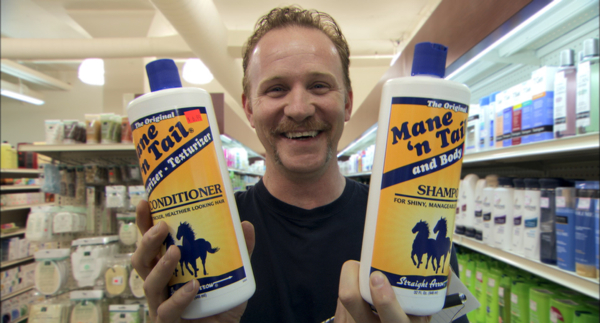Movie review by Greg Carlson
The logical extension of fast food fable “Super Size Me,” Morgan Spurlock’s “The Greatest Movie Ever Sold” – or more precisely, “POM Wonderful Presents: The Greatest Movie Ever Sold” – affably, jokingly, and breezily follows the moviemaker/media personality on a manufactured meta-quest to create a “documentary” about product placement entirely and transparently sponsored and funded by corporate partners. The idea is almost fiendishly attractive but the execution is vanilla; Spurlock goes out of his way to avoid, sidestep, and omit anything resembling argument, confrontation, or the impulse for critical thinking.
Instead, the moviemaker relies on his likable on-screen persona and a cascade of punch lines and gags to skim the surface of one of Hollywood’s worst kept secrets. Are we numb to the clutter generated by millions of “media impressions” or have the movie and culture industries become synonymous with the product-driven directive that suggests we can buy our way to happiness and fulfillment? Spurlock never grapples with these questions, opting instead to spend a significant amount of the movie’s running time chasing down meetings with the companies that don’t reject him immediately. Volkswagen, for example, says no way, and Spurlock scores one of the film’s biggest laughs at the expense of the German automaker.
When Spurlock isn’t walking and talking on camera, “The Greatest Movie Ever Sold” colorfully integrates the requisite amount of stock footage and film and television clips assiduously chosen for maximum giggles and guffaws. Additionally, the moviemaker enlists a parade of predominantly male talking heads to supply the sound bites, but the sheer number of academics paraded before Spurlock’s camera means that thinkers like Noam Chomsky only appear on screen for a few seconds, hardly enough time to say much of substance. Ralph Nader, tongue perhaps in cheek, accepts a pair of Merrells as self-described payola.
Contrasted with the academic scolds and critics, several Hollywood directors shrug their shoulders at the illusion of artistic autonomy and integrity when working for studios owned by massive multinationals. Quentin Tarantino, amusingly discusses being turned down by Denny’s for “Reservoir Dogs” and “Pulp Fiction.” “Rush Hour 3” director Brett Ratner, a man smart enough to know what he is selling despite the lingering aroma of rotting fish, seems unfazed by Spurlock’s softballs. Peter Berg name-checks Radiohead and Paul Thomas Anderson as exceptions to the rule while his own office clutter reminds us that one of his upcoming projects is a movie based on the board game “Battleship.”
Like Michael Moore, Spurlock is in and of himself a “brand,” another overworked point somewhat condescendingly beaten into the audience ad nauseam. Despite the movie’s dearth of penetrating insights, a visit to Sao Paulo, Brazil – a city whose elected officials initiated an almost complete prohibition on outdoor advertising – offers startling, science fiction-like visuals of a billboard-free landscape. Other moments, including integrated commercials for Spurlock’s sponsors and a time-warping visit with Jimmy Kimmel during which the talk show host quips that “The Greatest Movie Ever Sold” is like the “Inception” of documentaries, are on the mark if a little exhausting: it’s tough to judge and evaluate the insidiousness of marketing by making a feature-length advertisement.
